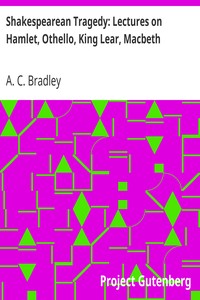Shakespearean Tragedy: Lectures on Hamlet, Othello, King Lear, Macbeth by Bradley
"Shakespearean Tragedy: Lectures on Hamlet, Othello, King Lear, Macbeth" by A.C. Bradley is a scholarly examination of key works by the renowned playwright William Shakespeare, likely written in the early 20th century. The text consists of a series of lectures that analyze the essence and structure of Shakespearean tragedy, focusing specifically on four of his most famous plays. The author delves into the nature of tragedy as presented by Shakespeare, discussing themes
such as character, moral order, and the existential struggles faced by the protagonists. The opening of the book introduces Bradley's intent to explore the fundamental characteristics of Shakespearean tragedy without delving into the playwright’s biography or his position in literary history. The author emphasizes the significance of dramatic appreciation and understanding the internal workings of the plays to foster enjoyment and comprehension among readers. He outlines his approach, indicating that the lectures will not only highlight the distinctive tragic elements in plays such as "Hamlet," "Othello," "King Lear," and "Macbeth" but also provide insights into the actions and motivations of the central characters. Through this analytical lens, Bradley aims to enhance the reader's engagement with these iconic tragedies. (This is an automatically generated summary.)
Read or download for free
| How to read | Url | Size | |||
|---|---|---|---|---|---|
| Read now! | https://www.gutenberg.org/ebooks/16966.html.images | 1.2 MB | |||
| EPUB3 (E-readers incl. Send-to-Kindle) | https://www.gutenberg.org/ebooks/16966.epub3.images | 545 kB | |||
| EPUB (older E-readers) | https://www.gutenberg.org/ebooks/16966.epub.images | 561 kB | |||
| EPUB (no images, older E-readers) | https://www.gutenberg.org/ebooks/16966.epub.noimages | 529 kB | |||
| Kindle | https://www.gutenberg.org/ebooks/16966.kf8.images | 1.1 MB | |||
| older Kindles | https://www.gutenberg.org/ebooks/16966.kindle.images | 1.0 MB | |||
| Plain Text UTF-8 | https://www.gutenberg.org/ebooks/16966.txt.utf-8 | 1009 kB | |||
| Download HTML (zip) | https://www.gutenberg.org/cache/epub/16966/pg16966-h.zip | 509 kB | |||
| There may be more files related to this item. | |||||
Similar Books
About this eBook
| Author | Bradley, A. C. (Andrew Cecil), 1851-1935 |
|---|---|
| Title | Shakespearean Tragedy: Lectures on Hamlet, Othello, King Lear, Macbeth |
| Credits |
Produced by Suzanne Shell, Lisa Reigel and the Online Distributed Proofreading Team at www.pgdp.net |
| Reading Level | Reading ease score: 65.2 (8th & 9th grade). Neither easy nor difficult to read. |
| Language | English |
| LoC Class | PR: Language and Literatures: English literature |
| Subject | Shakespeare, William, 1564-1616 -- Tragedies |
| Category | Text |
| EBook-No. | 16966 |
| Release Date | Oct 30, 2005 |
| Most Recently Updated | Dec 12, 2020 |
| Copyright Status | Public domain in the USA. |
| Downloads | 4310 downloads in the last 30 days. |
| Project Gutenberg eBooks are always free! | |

